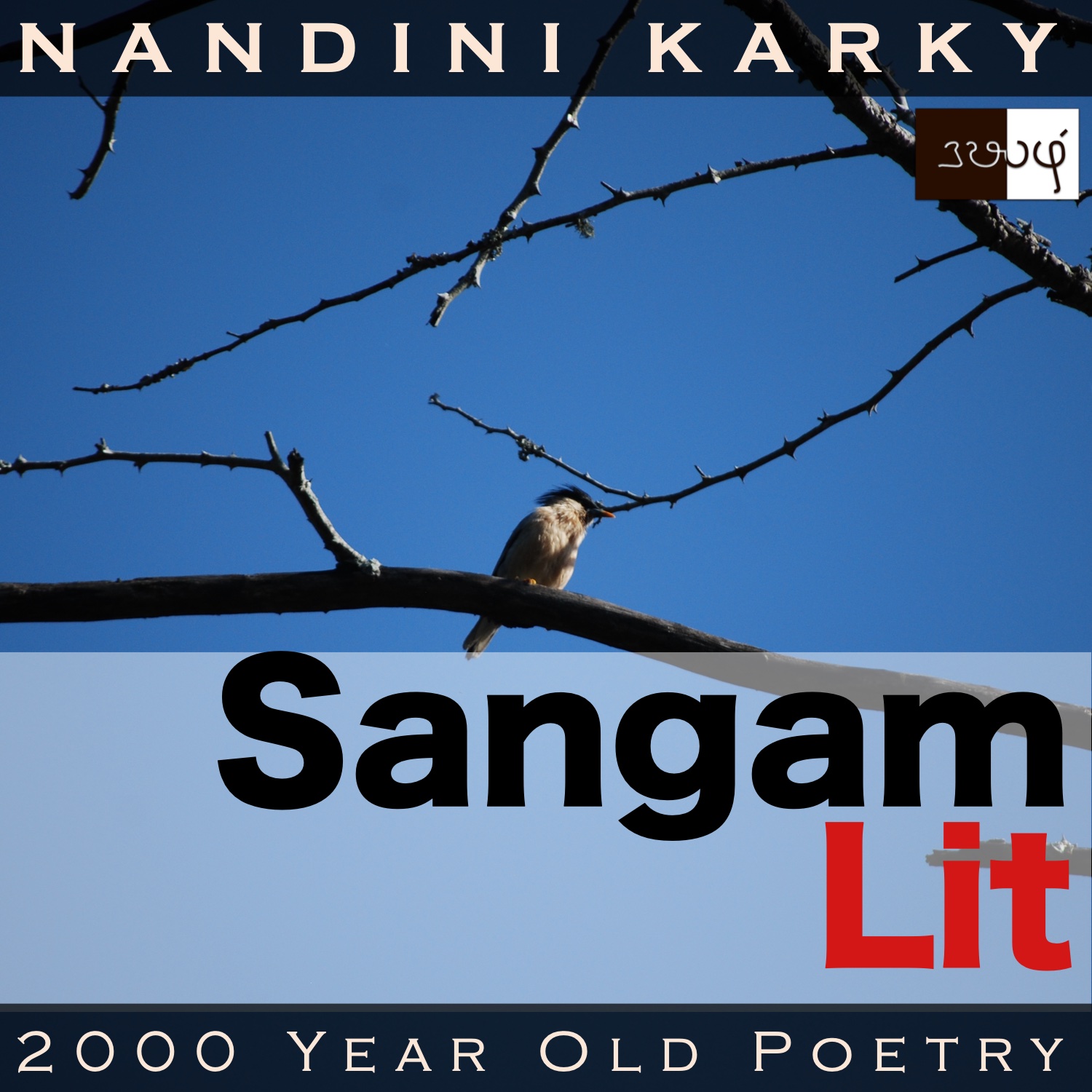Podcast: Play in new window | Download
Subscribe: Apple Podcasts | Spotify | Amazon Music | Android | iHeartRadio | TuneIn | RSS | More

In this episode, we perceive an interesting reaction to a message conveyed, as depicted in Sangam Literary work, Kurunthogai 207, penned by Uraiyanaar. The verse is situated in the drylands of ‘Paalai’ and speaks in the voice of the lady to her confidante, in response to the confidante’s news that the man has parted away.
”செப்பினம் செலினே செலவு அரிது ஆகும்” என்று,
அத்த ஓமை அம் கவட்டு இருந்த
இனம் தீர் பருந்தின் புலம்பு கொள் தெள் விளி
சுரம் செல் மாக்கட்கு உயவுத் துணை ஆகும்
கல் வரை அயலது தொல் வழங்கு சிறு நெறி,
நல் அடி பொறிப்பத் தாஅய்ச்
சென்றெனக் கேட்ட நம் ஆர்வலர் பலரே.
‘I already know’ is the core thought of this one! In the opening line ‘செப்பினம் செலினே செலவு அரிது ஆகும் என்று’ meaning ‘considering that travel is going to be difficult if I were to say that I’m going to travel’, the verse dwells on the thought process of a person. The words ‘அத்த ஓமை’ brings before our eyes ‘a toothbrush tree that grows in the dry regions’. From plant life, we move on to animal life in ‘இனம் தீர் பருந்து’ meaning ‘a bird that has moved away from its flock’. The contemporary meaning of the word ‘பருந்து’ is ‘eagle’. However, Sangam references to birds are not specific to particular ones, preferring to call a variety of birds with the same name. Hence, I have chosen to refer to this word commonly as ‘a bird’. Beautiful is the bond signified in the words ‘உயவுத் துணை’ meaning ‘a comforting companion’. It always excites me to see a phrase beginning with ‘தொல்’ in Sangam verses, for it means ‘ancient’. What is ancient to us is talking about something ancient to it, and that’s a marker of continuity of human history! The phrase in question here is ‘தொல் வழங்கு சிறு நெறி’ meaning ‘a narrow path that has been in use from ancient times’. Ending with the words ‘சென்றெனக் கேட்ட நம் ஆர்வலர் பலரே’ meaning ‘that he left, I heard from well-wishers’, the verse welcomes us to know more.
Drylands birds and trees depict a desolate picture indeed! The context reveals that the man and lady were leading a happy, married life when the man felt the need to part with the lady to go in search of wealth. The man parts away and the confidante brings this news to the lady. To her friend, the lady says, “He must have thought, ‘If I tell about my intention to part away, parting away would become impossible’. Perched on a beautiful splitting branch of the drylands ‘Omai’ tree, a bird that has left its flock, lets out a lament-filled clear call, which serves as the cure and companion for people traversing the harsh drylands, through that narrow path, near the mountain, which has been in use from yore. So as to leave his good footprints thither, he left in a hurry. This, I heard from our well-wishers many!” With these words, the lady tells her friend that she already knows of the man’s parting and hides within a subtle rebuke.
Time to explore the nuances. The lady starts by talking about what must have transpired in the man’s mind. Don’t we often write dialogues for others in our head? Something on those lines! She decides he must have come to the conclusion that if he were to leave only after telling the lady, then that leaving itself might not happen. Perhaps, he feared facing her sadness at the prospect of his leaving. After mentioning this, the lady’s mind zooms to an ‘Omai’ tree in the drylands, on which a bird is sitting alone, having lost its flock, and seemed to be sending out a clear call. Surprisingly, the cry of this lonely bird seems to be the consoling friend to those people who are traversing the drylands. And now, the lady connects it back to the man, and says, it’s on an ancient, narrow path in this drylands that the man went to leave his fine footprints. Saying that this news has already been brought to her by other well-wishers, the lady concludes.
That seemingly calm statement in the end about knowing the confidante’s news already is meant to be a sharp scolding for the confidante. Other people have already told me that he has left, and here you are, taking your own time to tell me, instead of speaking with the man and stopping him from parting away, the lady implies. Hope the confidante has a sound reply for the lady, for she needs to be that comforting drylands’ bird call to the lady in her long months of separation. The other curious thing here is the practice of the man leaving his beloved without even saying goodbye. In modern Tamil culture, such a behaviour would be frowned upon. In many occasions, I have seen how guests who come home, will make it a point to say bye, not only to the host family but also to the workers in the background, and this is something ingrained in this culture. So, when the man parts without that bye to his loved one, it appears so much more significant. The verse seems to beckon us to ponder about our own relationship with saying goodbyes!




Share your thoughts...